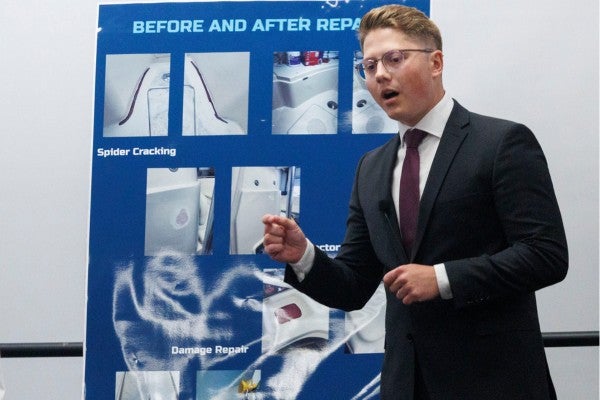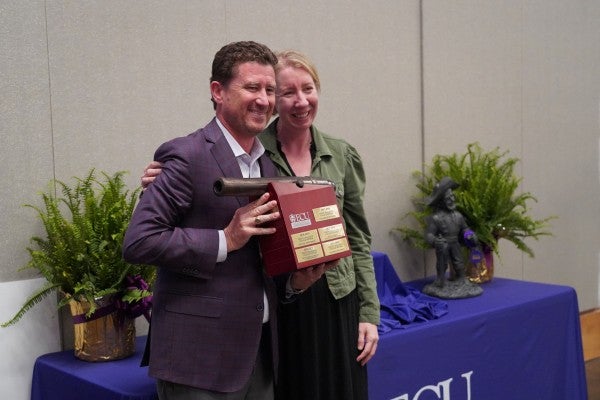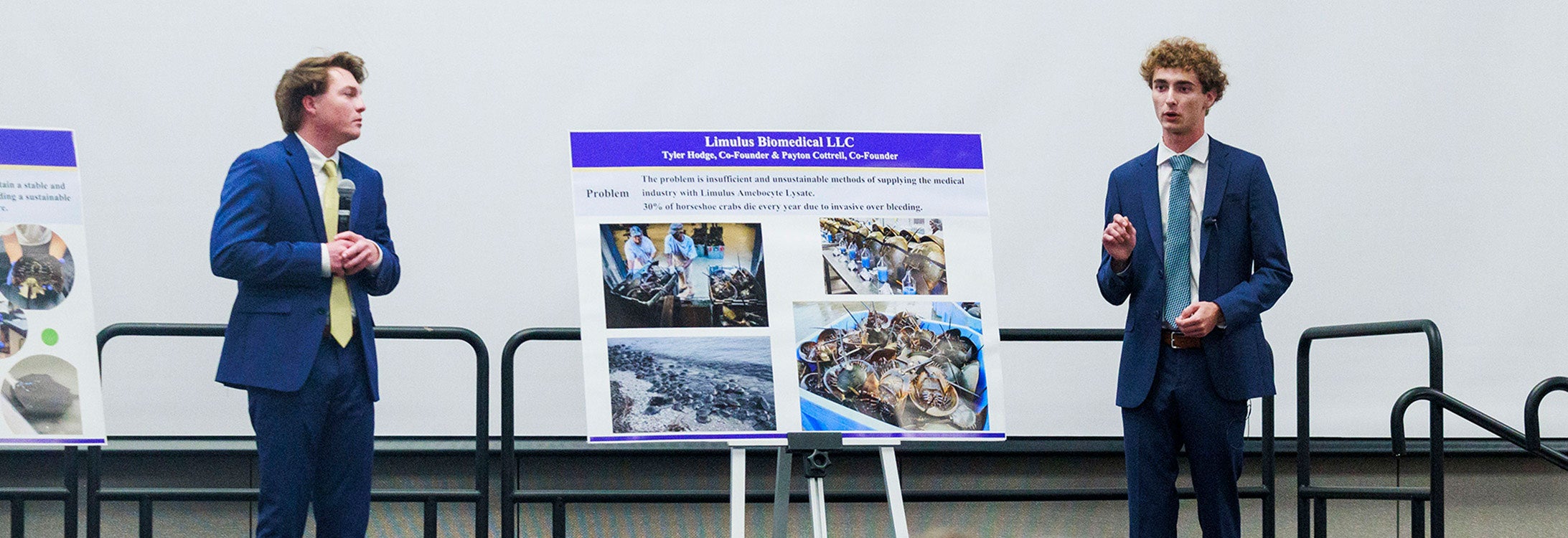Seventh annual Pirate Entrepreneurship Challenge finds winning idea … in the ocean
According to a National Library of Medicine article, limulus amebocyte lysate (LAL) is an extract found in the blood of the Atlantic horseshoe crab and helps keep injectable medications and vaccines bacteria-free, making them safe for patients. The current process of “bleeding” the horseshoe crabs is an “ecologically unsustainable practice,” states the article.
That practice could change, thanks to Limulus Biomedical, a business venture that will design, construct and maintain aquacultural systems of the American horseshoe crab to create a sustainable environment for crabs and the harvesting of the LAL found in them.
Limulus Biomedical won the seventh Pirate Entrepreneurship Challenge, held April 10 in the ECU Main Student Center. ECU entrepreneurship student Tyler Hodge of Morehead City and Payton Cottrell of Carteret Community College now have $15,000 in cash prizes to grow their venture, which started as two friends who wanted to make the results of an aquaculture research project a reality.
“He (Cottrell) came to me in November of 2022 … with the idea,” said Hodge, who is on an insulin pump, which gives him a personal stake in the idea. “He was looking for somebody that would really help him out with it, really get him going. I said it’s right up my alley. I have an entrepreneurial spark. I have the resources from East Carolina University, and I said, ‘Let’s get this ball rolling.’”
Limulus Biomedical is also getting the attention of other pitch competitions. The night before the Pirate Challenge finals, Hodge and Cottrell walked away with $5,000 after winning the Blue Economy Pitch competition hosted by the ECU Office of Licensing and Commercialization.
With their recent winnings, Hodge and Cottrell hope to “keep developing feed that’s used specifically for the horseshoe crab,” said Hodge.
“You would think feed is very simple, but to keep these guys healthy enough to bleed sustainably, we have to develop our feed, which is not on the market.”

Gage Palmer, right, pitches his product PALMQUATICS during the final round of the seventh annual Pirate Entrepreneurship Challenge. (Photo by Steven Mantilla)
Everybody’s a winner
For the first time in the challenge’s history, all participants walked away with cash prizes, in-kind services, or both, totaling almost $200,000.
Entrepreneurship student Gage Palmer won second place and $10,000 for PALMQUATICS, a business that works with boat dealerships and private owners to provide mobile repair services specializing in fiberglass and gel coat repair. Amber Faircloth, a doctoral candidate in rehabilitation sciences, won third place and $5,000 for her idea, Talkative, a virtual reality speaking environment that assists stuttering patients with real-world situations. Crossfit Greenville Kids and Surf Stick took fourth and fifth, and thanks to Robert Gluckman of Treasure Coast Urgent Care and Treasure Coast Primary Care, won $2,500 and $1,500, respectively. The Crisp Small Business Resource Center awarded $500 each to Iuvo and Horizon Shield, who tied for sixth place.
To select the winners, Pirate Challenge leaned on an esteemed group of judges familiar with what it takes for businesses and ideas to succeed. Those judges included:
- Holly DeArmond – director, Global Consortium of Entrepreneurship Centers, Rice University
- Van Isley ’85 – retired executive, ECU Trustee, namesake of the Isley Innovation Hub
- Jamerus Payton – 2022 PEC winner, owner of Carolina Chicken and Waffles, Arthur School MBA candidate
- Mark Wdowik – president and CEO of East Carolina Angels and the Pirate Entrepreneurship Fund
Isley is no stranger to the PEC. He’s been to almost every Pirate Challenge, with the April 10 finals being the second time serving as judge.
“They (finalists) were very impressive,” said Isley. “They are very competitive, smart and comfortable up there (pitching).”
About Limulus, Isley said, “They have a very viable concept, and it’s well thought out. It will be fun and exciting to see how they do.”
“The fact they’re producing something so critical to everyone’s life is something that we (judges) saw as an opportunity to help them,” said Wdowik, whose Pirate Entrepreneurship Fund is providing Limulus access to an equity investment in the company up to $15,000.
New to this year’s challenge is the Rural Community Impact Award, sponsored by First National Bank. Winning the award was PALMQUATICS, a mobile boat repair venture. The team took home an additional $10,000 to help grow the business in rural North Carolina.
“I’m so excited for PALMQUATICS,” said Ashby Tarkington, FNB’s Greenville market executive. “They truly do cover all of eastern North Carolina and our rural communities.”

College of Business Interim Dean Mike Harris (left) receives the Challenge Cannon from Allison S. Danell (right), dean of the Thomas Harriot College of Arts and Sciences. The Challenge Cannon is awarded to the dean whose student wins the Pirate Entrepreneurship Challenge. The cannon will stay at the COB until next year’s Pirate Challenge. (Photo by Michael Rudd)
According to the Miller School’s David Mayo, organizer of the Pirate Challenge, the Pirate Challenge’s goals are to create a culture of entrepreneurship across campus, mentor entrepreneurs in a low-risk environment, and provide funding to help entrepreneurs create high-impact startups.
“We are all here tonight because we believe that entrepreneurship is a tool that can positively impact our students and communities,” said Mayo. “And that impact is reflected in the almost $800k in cash and services we’ve awarded since the inaugural Pirate Challenge in 2018.”
Mentors for this year’s finalists included Kate Wiggins of NC Idea, Tyler Lumley of the Small Business Technology Development Center, Vin McCaffrey of PrestoSports, April Kelly, entrepreneur and founder of Greenville-based Sure!, and Tee Steinberg, banking executive and an entrepreneur-in-residence at the Miller School.
Wiggins mentored Limulus. She was impressed when she saw Hodge and Cottrell pitch in the second of the Pirate Challenge. As a mentor, she helped refine their pitches and brought in individuals from the entrepreneurial ecosystem in North Carolina who provided feedback on the presentation and offered advice.
“Tyler and Payton listened intently, and what you saw tonight was a slam dunk,” said Wiggins.
“What we witnessed tonight epitomizes what we’re trying to do at the Miller School of Entrepreneurship,” said Chip Galusha, acting director, Miller School of Entrepreneurship. “We want to give ECU students opportunities to cultivate and unleash their ideas to benefit eastern North Carolina, the state and maybe the whole country. The Pirate Entrepreneurship Challenge has become the signature event of that mission.”

Van Isley, left, and Mark Wdowik participate in a Q&A session with Pirate Entrepreneurship Challenge finalist. (Photo by Steven Mantilla)
